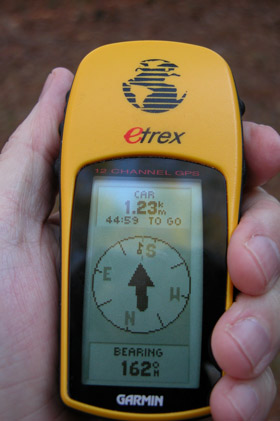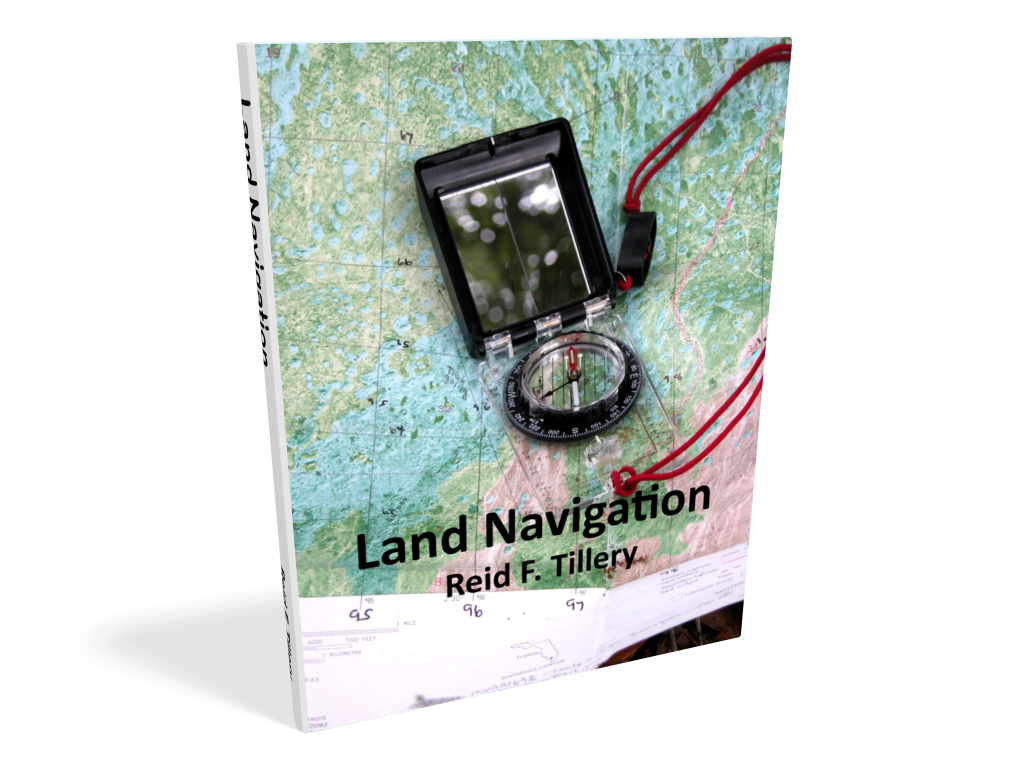Announcement: My online Land Navigation course includes four hours of video instruction, and two downloadable PDF books, all for about the same price as a typical paperback book. Get my Land Navigation course here.
Introduction to the
Global Positioning System
The Global Positioning System (GPS) revolutionized navigation. A Wal-Mart clerk first made me aware of this great revolution around the turn of the millenium. While browsing in the sporting goods department of a Wal-Mart store, I noticed this little yellow instrument about the size of a large candy bar.

My First Garmin Etrex -- A Revolution in Navigation
"What's this," I asked the clerk.
"Oh, that...that's a GPS. It's used for navigation" he replied.
I was looking at a Garmin Etrex which retailed for about $100. After reading a bit about it from its accompanying literature, I still had more questions than answers.
"Okay, let me ask you this," I inquired once more of the clerk. "Will it actually give me my latitude and longitude?" thinking to myself that the answer would surely be more or less "No." I mean, how could anything that size and priced that little actually do that?
"Oh yes," he said. "It'll do that and a whole lot more."
He went on to explain what else it would do but I was so excited I didn't hear anything after the "Oh yes."
"I'll take it," I said, and walked out with all the eager anticipation and wonderment of an intrepid explorer who had just stumbled upon the Holy Grail.
The Global Positioning System, meaning the entire system of satellites and everything is abbreviated as GPS. Users, however, have taken to calling the receivers themselves as GPSes. In line with common usage, I do that here also.
I knew if I could somehow get my lat/long coordinates with this mysterious little yellow box, I could pinpoint myself on a topo map, and the big challenge of navigation--that is, the challenge of staying found--would no longer be an issue. Those days of anxiously hoping I was where I thought I was were over. Finally, I had the ultimate answer to navigation right here in the palm of my hand.
I figured that map and compass would soon be relegated to the 20th century, and the Global Positioning System would be the 21st century way of doing things. And to some extent that's true. People make good use of GPSes these days, but as I soon learned, they're good but they are by no means perfect.
Make no mistake. We still need our maps and compasses. And we still need to know how to use them. As it turns out, a GPS is just another tool--albeit a marvelous tool--in our navigation kits. But as you may have picked up by now by reading this site, A GOOD NAVIGATOR NEVER LIKES TO RELY SOLELY ON ANY ONE PIECE OF NAVIGATIONAL INFORMATION--especially if that information comes from a fancy little 21st-century hand-held electronic gadget that runs on AA batteries.
Even though GPS has its limitations (batteries can die, or it can fail to receive a signal, for examples), when it's working right, it's a wonderful tool for a navigator to have. In fact, as cheap and compact as GPSes are, it makes no sense not to have one with you while traveling across the terrain. (Just be sure you know how to navigate without it. My online video-based land-navigation course can teach you to do that.)
So let's look into how the Global Positioning System works, and what it can do for you, the cross-country traveler:
How to Use a GPS in the Wilderness
How to Use a GPS on the Road
For details on specific GPS receivers, here are some product reviews you may find helpful:
Garmin GPSMap 60

